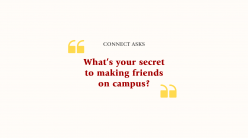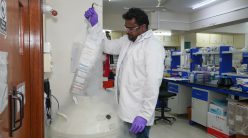Twenty years ago, T Chandrashekar joined PB Seshagiri’s lab at the Department of Developmental Biology and Genetics or DBG (earlier called Molecular Reproduction, Development and Genetics) as a lab assistant. Since then, he has helped countless students with their research by prepping their worktables every day. Along the way, he worked at different labs in the Department of Biochemistry, the Central Animal Facility (CAF) and DBG. Now, he works in Deepak Kumar Saini’s Signalling in Ageing, Inflammation and Infection (SAInI) lab. Chandrashekar speaks with CONNECT about his experiences working at IISc.
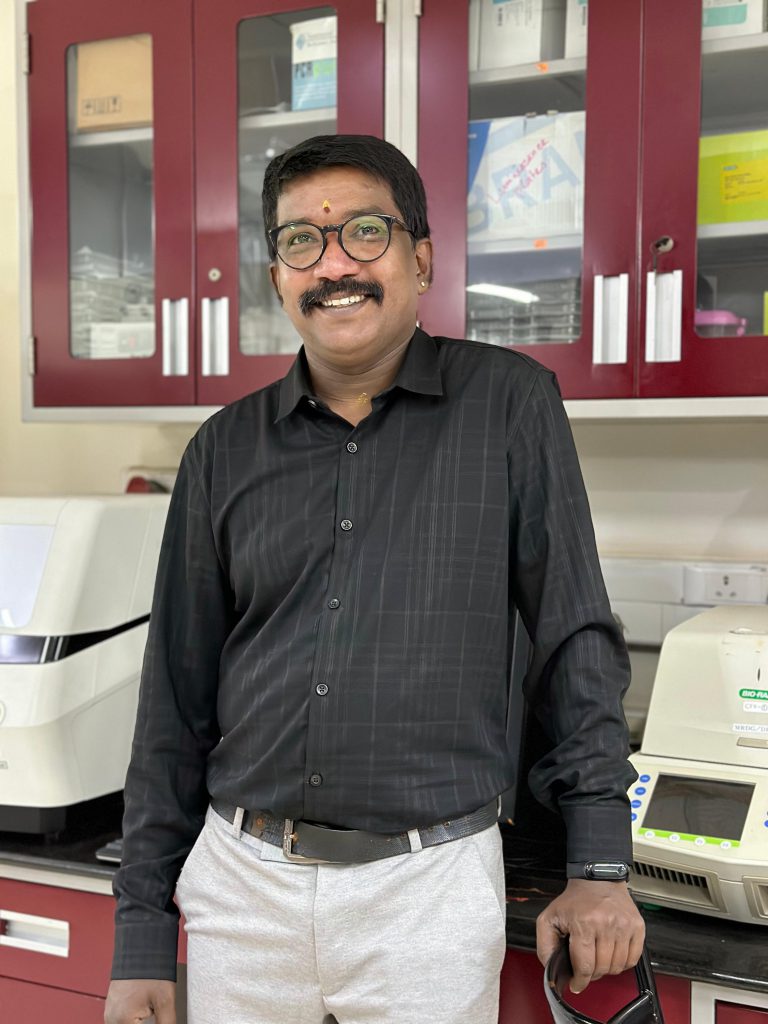
When did you join IISc?
I joined Professor Seshagiri’s lab at DBG at IISc in 2004. During those times, our salaries were less, only Rs 1,200 rupees per month, but never did any student or professor, in any instance, regard me as ‘just a lab assistant.’ Rather than treat us like workers, they treated us like friends. They looked after us very well. So, we also looked forward to working with them. It could be autoclaving, lab cleaning, purchasing equipment or handling stores – they would work together with us. That is why I never felt troubled working here and continued.
I can put it this way: At IISc, we got food on the table because of them [faculty and students] and in return, they got some work done from us. The salary doesn’t matter because I feel proud to work here. We spend so much money to take care of our health, but here, at IISc, you can take care of your health along with work because of the surroundings.
How has your work changed from when you joined to now?
The work hasn’t changed. It involves washing glassware, preparing media, and other activities. But the instruments have changed; earlier the autoclave machine was a pressure cooker, now it is different. The work pressure was higher in the earlier days, but it is reduced now. Earlier, there were a lot of students and now their number is less.
‘Rather than treat us like workers, they treated us like friends’
Which part of your work do you like most?
I like autoclaving the most. I also like filling pipette tips – they need to be washed properly, dried, autoclaved and then filled with media for cell culture. When I work, I put on some songs in the background because it takes two to three hours to autoclave 20-30 boxes of pipette tips and each box contains 50 individual tips. Even with washing glassware, there is a specific procedure to be followed. First, I rinse the glassware in water, then I dip them in soap water, brush, rinse again and dry, and then autoclave them again for reuse. The washing process itself takes about one and a half hours. Packing the pipettes with chemicals takes an hour.
I finish other responsibilities like cleaning the labs in the morning. Other odd jobs include cleaning the culture lab, going to the post office to pick up the professor’s parcels, and going to the bank.
Previously, we were sent to submit paperwork, or to the stores to get office and lab items. Now, they have hired an administrative person who handles the paperwork. My job has narrowed down to lab work. Compared to then, it is easier now. I can manage my work because the professors and students are good at heart. Otherwise, it would have been difficult.
‘I put on some songs in the background because it takes two to three hours to autoclave’
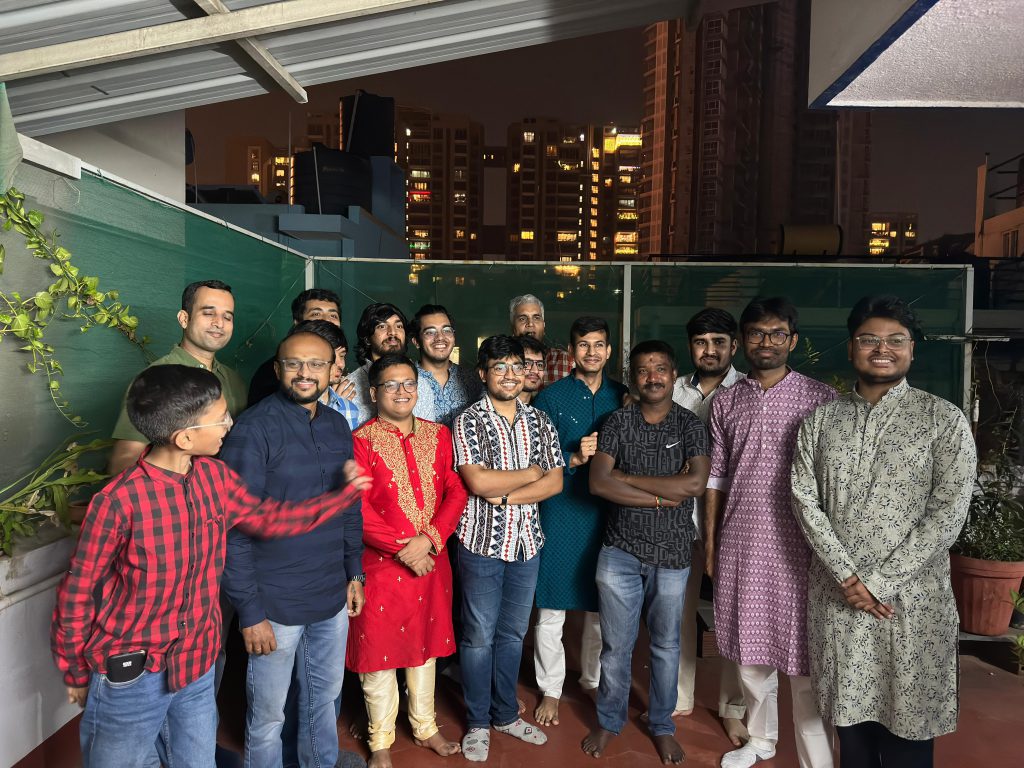
Have you faced any difficulties at work?
For 20 years, as far as I remember, there have been no issues. It’s like I don’t know the meaning of the word difficulty at IISc. The students always inform us beforehand if they require anything from us. They never come to us at the last moment, or they never hurry us along.
How do you handle any emergencies in the lab?
If anything breaks, we clean it carefully. We are confident that the professor won’t get mad at us. The students tell us, ‘It’s okay if something breaks, but you are important. So, take care of yourself. Wear gloves and a lab coat; be careful when washing beakers or glassware.’ Even if there is a small injury, they help us clean up and help us with first-aid. They tell us to work responsibly. If, by chance, an instrument was left on or if something gets broken by mistake and needs to be fixed and it costs around Rs 30,000-35,000, nobody questions us or demands that we pay for the broken instrument.
Right now, I work at Professor Deepak Kumar Saini’s lab. He treats me in a friendly manner. He has helped me during my marriage and even during the delivery of my kid. He invites me to dinner at his house a few times a year.
‘I do everything [in the lab] except experiments’
How do you manage your workload since there are different types of students working at the same time – PhD students, project assistants, and undergraduate students?
My work is not affected by that at all. Just like PhD students, there would be summer trainees and JRFs (Junior Research Fellows), and they would all behave cordially with me. They would ask for whatever they wanted beforehand, and they would do it politely.
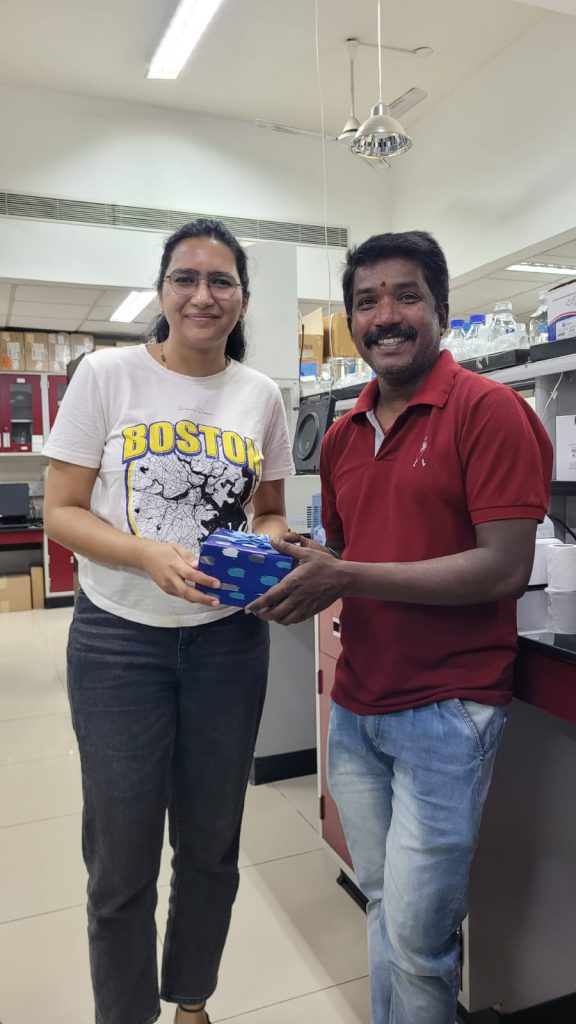
What got you interested in this job?
My friend’s father used to work here [at IISc]. Later, my friend also joined as a lab assistant. He informed me of an opening. I was unemployed so I started working here. Even now, my designation is lab assistant. Cleaning glassware, preparing media, autoclaving, prepping for cell culture, getting items like rubber bands and stationery from the Central Stores – I do all of this. I do everything except experiments. Other lab assistants have also helped with taking care of animals, drawing blood from animals – for example, there is a procedure where you take blood samples from a live rabbit or from the eyes of mice. We learnt this by watching other students perform it themselves. We’d help them if there was nobody from the animal facility that day.
Was there any project that you worked on that was interesting for you?
Back when I worked at the Central Animal Facility (CAF), there was research on pseudo pregnant mice. I think they switched eggs from one animal to the other. They used to inject these mice with something, and the mice would turn green. We’d feel happy that we helped them, and we’d feel happy to look at the green mice.
What are your best memories with the students?
Students have bought me chappals because the ones I had were torn. This was back when I had a minimum salary. Not even a single day did they take money from me for coffee. Even if I was a few minutes late for lunch, they would ask me to stop and take me to the mess. If the students were happy or got some good news, they would take me along for fancy lunches at very good restaurants.
Many of the students who have passed out, and who have moved abroad, have visited me and given me chocolates and perfume. Before my wedding, one of the students gave my fiancée and I sarees and clothes.
I worked with international students too. There was a student from Iran who did his PhD for five years. He would bring dry fruits when he came from his hometown. He didn’t know the language, but he managed by speaking a little bit of Hindi.
‘If the students were happy or got some good news, they would take me along for fancy lunches at very good restaurants’
If I compliment someone by saying, ‘this looks nice,’ for example, a pen or a watch; they just give it to me. During their birthday celebrations, they ask ‘what do you feel like eating?’
These students would be up all night, running experiments. Suppose I had to rush home, but at that time they ask me to autoclave something for them, I wouldn’t rush to finish it in 10 minutes. It’s okay if it’s more work for me or if I’m late for my appointment. I would complete my work correctly for them. Because they work for five years, and one experiment usually takes over 4-5 months. If I prepare the media incorrectly or turn off the autoclave just to rush for my appointments, their experiment of four months will be ruined. So, why should I not help them with even small things like autoclaving or providing milli-Q water? I do what is asked, to the best of my abilities.
With inputs from Malavika P Pillai
